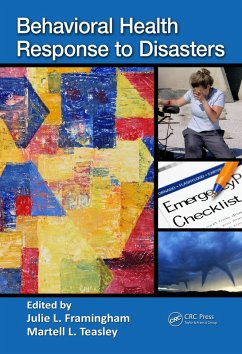Behavioral Health Response to Disasters (eBook, ePUB)
Redaktion: Framingham, Julie; Teasley, Martell L.
142,95 €
142,95 €
inkl. MwSt.
Sofort per Download lieferbar

71 °P sammeln
142,95 €
Als Download kaufen

142,95 €
inkl. MwSt.
Sofort per Download lieferbar

71 °P sammeln
Jetzt verschenken
Alle Infos zum eBook verschenken
142,95 €
inkl. MwSt.
Sofort per Download lieferbar
Alle Infos zum eBook verschenken

71 °P sammeln
Behavioral Health Response to Disasters (eBook, ePUB)
Redaktion: Framingham, Julie; Teasley, Martell L.
- Format: ePub
- Merkliste
- Auf die Merkliste
- Bewerten Bewerten
- Teilen
- Produkt teilen
- Produkterinnerung
- Produkterinnerung

Bitte loggen Sie sich zunächst in Ihr Kundenkonto ein oder registrieren Sie sich bei
bücher.de, um das eBook-Abo tolino select nutzen zu können.
Hier können Sie sich einloggen
Hier können Sie sich einloggen
Sie sind bereits eingeloggt. Klicken Sie auf 2. tolino select Abo, um fortzufahren.

Bitte loggen Sie sich zunächst in Ihr Kundenkonto ein oder registrieren Sie sich bei bücher.de, um das eBook-Abo tolino select nutzen zu können.
Disasters can cause long-term disruptions to the routines of individuals and communities, placing survivors at risk of developing serious mental health and substance abuse problems. Disaster behavioral health services provide emotional support, help normalize stress reactions, assess recovery options, and encourage healthy coping behaviors. They al
- Geräte: eReader
- mit Kopierschutz
- eBook Hilfe
- Größe: 3.09MB
Andere Kunden interessierten sich auch für
![Behavioral Health Response to Disasters (eBook, PDF) Behavioral Health Response to Disasters (eBook, PDF)]() Behavioral Health Response to Disasters (eBook, PDF)142,95 €
Behavioral Health Response to Disasters (eBook, PDF)142,95 €![Medical Disaster Response (eBook, PDF) Medical Disaster Response (eBook, PDF)]() Medical Disaster Response (eBook, PDF)142,95 €
Medical Disaster Response (eBook, PDF)142,95 €![Medical Disaster Response (eBook, ePUB) Medical Disaster Response (eBook, ePUB)]() Medical Disaster Response (eBook, ePUB)142,95 €
Medical Disaster Response (eBook, ePUB)142,95 €![On-Scene Guide for Crisis Negotiators (eBook, ePUB) On-Scene Guide for Crisis Negotiators (eBook, ePUB)]() Frederick J. LanceleyOn-Scene Guide for Crisis Negotiators (eBook, ePUB)88,95 €
Frederick J. LanceleyOn-Scene Guide for Crisis Negotiators (eBook, ePUB)88,95 €![Chemical Warfare Agents (eBook, ePUB) Chemical Warfare Agents (eBook, ePUB)]() Chemical Warfare Agents (eBook, ePUB)245,95 €
Chemical Warfare Agents (eBook, ePUB)245,95 €![Magico-Religious Groups and Ritualistic Activities (eBook, ePUB) Magico-Religious Groups and Ritualistic Activities (eBook, ePUB)]() Tony M. KailMagico-Religious Groups and Ritualistic Activities (eBook, ePUB)142,95 €
Tony M. KailMagico-Religious Groups and Ritualistic Activities (eBook, ePUB)142,95 €![Bioterrorism (eBook, ePUB) Bioterrorism (eBook, ePUB)]() Joseph R. Masci M. D.Bioterrorism (eBook, ePUB)186,95 €
Joseph R. Masci M. D.Bioterrorism (eBook, ePUB)186,95 €-
-
-
Disasters can cause long-term disruptions to the routines of individuals and communities, placing survivors at risk of developing serious mental health and substance abuse problems. Disaster behavioral health services provide emotional support, help normalize stress reactions, assess recovery options, and encourage healthy coping behaviors. They al
Dieser Download kann aus rechtlichen Gründen nur mit Rechnungsadresse in A, B, BG, CY, CZ, D, DK, EW, E, FIN, F, GR, HR, H, IRL, I, LT, L, LR, M, NL, PL, P, R, S, SLO, SK ausgeliefert werden.
Produktdetails
- Produktdetails
- Verlag: Taylor & Francis eBooks
- Seitenzahl: 441
- Erscheinungstermin: 23. April 2012
- Englisch
- ISBN-13: 9781466562332
- Artikelnr.: 39142685
- Verlag: Taylor & Francis eBooks
- Seitenzahl: 441
- Erscheinungstermin: 23. April 2012
- Englisch
- ISBN-13: 9781466562332
- Artikelnr.: 39142685
- Herstellerkennzeichnung Die Herstellerinformationen sind derzeit nicht verfügbar.
Julie L. Framingham, MSW, has an extensive background in writing disaster grants and managing large federally funded disaster behavioral health recovery projects that have provided crisis counseling, clinical interventions, and case management services for hurricane and tornado survivors. She was the director of the SAMHSA-funded Project Recovery and the FEMA-funded Project H.O.P.E. (Helping Our People in Emergencies) in Florida from 2005 through 2008. Each of the programs managed represented either new approaches to supporting survivors or a paradigm shift toward more evidenced-based technologies for dealing with the reactions to traumatic events. She has made numerous presentations at state and national conferences on disaster behavioral health, and she has served as a consultant and trainer for the Substance Abuse and Mental Health Services Administration's Disaster Technical Assistance Center. Ms. Framingham also has collaborated with the National Center for Posttraumatic Stress Disorder, the National Child Traumatic Stress Network, and the Administration for Children and Families to develop new approaches to mental health intervention and case management services for disaster survivors. Martell L. Teasley, PhD , is an associate professor and chair of the Social Work and Disaster Recovery Certificate Program at Florida State University College of Social Work. Part of his research agenda includes a focus on disaster relief and recovery with a particular emphasis on cultural competence and vulnerable populations. Dr. Teasley works with several faith-based organizations in educating and training disaster case managers and paraprofessionals. This includes the evaluation of case management practices and emergency management organizational readiness assessments. He has served as a consultant for the Administration for Children and Families on the development of national case management standards and presented both nationally and internationally on disaster planning, relief, and recovery.
Overview of the History and Fundamental Concepts behind Disaster Behavioral
Health. Past Disaster Experiences and Behavioral Health Outcomes. Disaster
Behavioral Health Outreach: A Nontraditional Approach to Assisting
Survivors. Organizational Response to Disasters and Key Partners.
Governmental Roles and Responsibilities in Disaster Behavioral Health
Response and Recovery. Nongovernmental Organizations Responding to
Disasters in the United States. Disaster Mental Health: A Public Health
Paradigm. Psychological Resilience and Pathological Responses to Disaster.
Coping with Loss and Overcoming Trauma. Mental Health Outcomes of Disasters
and Terrorism. At-Risk Populations, Disaster Risk Factors, and Individual
and Community Vulnerability. Disaster Behavioral Health for Children and
Adolescents: Best Practices for Preparedness, Response, and Recovery.
Disaster Behavioral Health and Older Adults: American and Canadian
Readiness and Response. Cultural Competence in Behavioral Health Disaster
Response: The Challenge, the Opportunity. Helping the Helpers: Ameliorating
Secondary Traumatic Stress in Disaster Workers. Understanding Climatic,
Geographic, and Topographic Considerations for Assessing Disaster
Vulnerability. Addressing Barriers within Systems of Care. Disaster
Vulnerability and the School Setting: Understanding Environmental Risk and
Implications for Behavioral Health Response. Issues in Providing Mental and
Medical Health Care in Long-Term Care Settings during Disasters. Delivery
of Behavioral Health Services in General and Functional Needs Shelters.
Disaster Behavioral Health Interventions. Initial Behavioral Health
Response: The Conundrums of a State Crisis Counseling Program. Long-Term
Mental Health Treatment for Adult Disaster Survivors. Disaster and
Substance Abuse Services. Understanding Disaster Recovery Case Management
and Behavioral Health: A Review of Research. Leaving a Legacy: Training and
Community Empowerment. Disaster Mental Health Services: Implementation,
Training, and Sustainability. The Role of Social Marketing in Developing
Disaster Behavioral Health Programs. Planning for Disaster: A Behavioral
Health Perspective.
Health. Past Disaster Experiences and Behavioral Health Outcomes. Disaster
Behavioral Health Outreach: A Nontraditional Approach to Assisting
Survivors. Organizational Response to Disasters and Key Partners.
Governmental Roles and Responsibilities in Disaster Behavioral Health
Response and Recovery. Nongovernmental Organizations Responding to
Disasters in the United States. Disaster Mental Health: A Public Health
Paradigm. Psychological Resilience and Pathological Responses to Disaster.
Coping with Loss and Overcoming Trauma. Mental Health Outcomes of Disasters
and Terrorism. At-Risk Populations, Disaster Risk Factors, and Individual
and Community Vulnerability. Disaster Behavioral Health for Children and
Adolescents: Best Practices for Preparedness, Response, and Recovery.
Disaster Behavioral Health and Older Adults: American and Canadian
Readiness and Response. Cultural Competence in Behavioral Health Disaster
Response: The Challenge, the Opportunity. Helping the Helpers: Ameliorating
Secondary Traumatic Stress in Disaster Workers. Understanding Climatic,
Geographic, and Topographic Considerations for Assessing Disaster
Vulnerability. Addressing Barriers within Systems of Care. Disaster
Vulnerability and the School Setting: Understanding Environmental Risk and
Implications for Behavioral Health Response. Issues in Providing Mental and
Medical Health Care in Long-Term Care Settings during Disasters. Delivery
of Behavioral Health Services in General and Functional Needs Shelters.
Disaster Behavioral Health Interventions. Initial Behavioral Health
Response: The Conundrums of a State Crisis Counseling Program. Long-Term
Mental Health Treatment for Adult Disaster Survivors. Disaster and
Substance Abuse Services. Understanding Disaster Recovery Case Management
and Behavioral Health: A Review of Research. Leaving a Legacy: Training and
Community Empowerment. Disaster Mental Health Services: Implementation,
Training, and Sustainability. The Role of Social Marketing in Developing
Disaster Behavioral Health Programs. Planning for Disaster: A Behavioral
Health Perspective.
Overview of the History and Fundamental Concepts behind Disaster Behavioral
Health. Past Disaster Experiences and Behavioral Health Outcomes. Disaster
Behavioral Health Outreach: A Nontraditional Approach to Assisting
Survivors. Organizational Response to Disasters and Key Partners.
Governmental Roles and Responsibilities in Disaster Behavioral Health
Response and Recovery. Nongovernmental Organizations Responding to
Disasters in the United States. Disaster Mental Health: A Public Health
Paradigm. Psychological Resilience and Pathological Responses to Disaster.
Coping with Loss and Overcoming Trauma. Mental Health Outcomes of Disasters
and Terrorism. At-Risk Populations, Disaster Risk Factors, and Individual
and Community Vulnerability. Disaster Behavioral Health for Children and
Adolescents: Best Practices for Preparedness, Response, and Recovery.
Disaster Behavioral Health and Older Adults: American and Canadian
Readiness and Response. Cultural Competence in Behavioral Health Disaster
Response: The Challenge, the Opportunity. Helping the Helpers: Ameliorating
Secondary Traumatic Stress in Disaster Workers. Understanding Climatic,
Geographic, and Topographic Considerations for Assessing Disaster
Vulnerability. Addressing Barriers within Systems of Care. Disaster
Vulnerability and the School Setting: Understanding Environmental Risk and
Implications for Behavioral Health Response. Issues in Providing Mental and
Medical Health Care in Long-Term Care Settings during Disasters. Delivery
of Behavioral Health Services in General and Functional Needs Shelters.
Disaster Behavioral Health Interventions. Initial Behavioral Health
Response: The Conundrums of a State Crisis Counseling Program. Long-Term
Mental Health Treatment for Adult Disaster Survivors. Disaster and
Substance Abuse Services. Understanding Disaster Recovery Case Management
and Behavioral Health: A Review of Research. Leaving a Legacy: Training and
Community Empowerment. Disaster Mental Health Services: Implementation,
Training, and Sustainability. The Role of Social Marketing in Developing
Disaster Behavioral Health Programs. Planning for Disaster: A Behavioral
Health Perspective.
Health. Past Disaster Experiences and Behavioral Health Outcomes. Disaster
Behavioral Health Outreach: A Nontraditional Approach to Assisting
Survivors. Organizational Response to Disasters and Key Partners.
Governmental Roles and Responsibilities in Disaster Behavioral Health
Response and Recovery. Nongovernmental Organizations Responding to
Disasters in the United States. Disaster Mental Health: A Public Health
Paradigm. Psychological Resilience and Pathological Responses to Disaster.
Coping with Loss and Overcoming Trauma. Mental Health Outcomes of Disasters
and Terrorism. At-Risk Populations, Disaster Risk Factors, and Individual
and Community Vulnerability. Disaster Behavioral Health for Children and
Adolescents: Best Practices for Preparedness, Response, and Recovery.
Disaster Behavioral Health and Older Adults: American and Canadian
Readiness and Response. Cultural Competence in Behavioral Health Disaster
Response: The Challenge, the Opportunity. Helping the Helpers: Ameliorating
Secondary Traumatic Stress in Disaster Workers. Understanding Climatic,
Geographic, and Topographic Considerations for Assessing Disaster
Vulnerability. Addressing Barriers within Systems of Care. Disaster
Vulnerability and the School Setting: Understanding Environmental Risk and
Implications for Behavioral Health Response. Issues in Providing Mental and
Medical Health Care in Long-Term Care Settings during Disasters. Delivery
of Behavioral Health Services in General and Functional Needs Shelters.
Disaster Behavioral Health Interventions. Initial Behavioral Health
Response: The Conundrums of a State Crisis Counseling Program. Long-Term
Mental Health Treatment for Adult Disaster Survivors. Disaster and
Substance Abuse Services. Understanding Disaster Recovery Case Management
and Behavioral Health: A Review of Research. Leaving a Legacy: Training and
Community Empowerment. Disaster Mental Health Services: Implementation,
Training, and Sustainability. The Role of Social Marketing in Developing
Disaster Behavioral Health Programs. Planning for Disaster: A Behavioral
Health Perspective.







